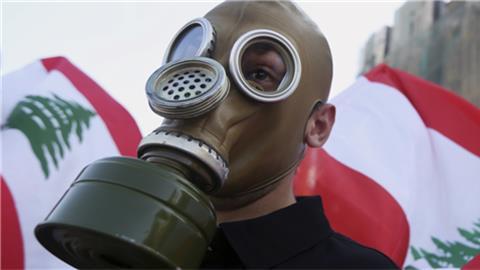
Al Jazeera
Matn, Lebanon – A winding road to the mountainous region that rises over Beirut offers an unobstructed view of the capital, surrounded by the sea. Today, the road itself is littered with garbage; huge piles have accumulated on the side of the road, along with burned scraps of trash.
Lebanon’s garbage crisis, unprecedented in the country’s recent history, continues to persist nearly a month since the mid-July closure of Naameh, the city’s main landfill, due to overcapacity. Mountains of garbage were left to pile up in the country’s capital and the surrounding mountains, while a lack of suitable alternative dumping grounds has spurred protests over the government’s failure to find a solution.
As politicians continue to bicker over how to handle the situation, activists, non-governmental organisations and local municipalities have taken matters into their own hands, pushing for local recycling and waste treatment initiatives. Others have been burning the piles of trash that have accumulated around Beirut on site, even collecting it and dumping it in quarries, under bridges, in rivers and in abandoned parking lots, further exacerbating the already desperate situation.
At a protest organised by civil society activists on Saturday, about 1,500 people showed up to chant anti-government slogans and demand the resignation of Environment Minister Mohammad Machnouk. They also called for a nationwide recycling campaign and for municipalities to play a larger role in waste management.
The protest was the third such demonstration since the garbage crisis emerged last month. Several demonstrators expressed pessimism about what these demonstrations could achieve.
"You can tell by looking around [that] this protest is basically being attended by Beirut’s ‘elite’ – the activist crowd, rather than the masses," Walid, a 32-year-old resident of Beirut, told Al Jazeera. "At the same time, if you’re not going to come down to protest against this issue, then you shouldn’t complain about the state of the country."
"The garbage is a metaphor for everything else that’s happening in the country where the government has really reached a new level of dysfunction," he added.
Lebanon has been without a president for over a year, unable to vote for a new one since May 2014, due to parliament’s failure to meet a two-thirds quorum required to hold an electoral session. The country has also been suffering from crippling electricity cuts, with some areas facing power cuts for up to 11 hours a day during a searing heatwave.
The stench of the garbage in the streets, coupled with the toxic gases released when residents resort to burning piles of trash, have further angered citizens.
The government, which is divided over how to discuss items on its agenda, has been skirting the issue.
Last week, it declared a reopening of bids for waste management in Beirut and its surroundings – three private companies have already submitted tenders – hoping that such a move would restore public confidence.
Yet, activists say this is not a satisfactory solution, as it will take between six months and a year for the implementation of a new system or even the creation of a new landfill.
The daily problem of what to do with garbage – which amounts to approximately 3,000 tonnes for Beirut and its surroundings a day – remains at the forefront, as
stone quarries, bridges, parking lots and unpopulated areas are serving as makeshift trash dumps.
Politicians, including the environment minister, have urged the public to do their part.
"I call on the citizens to cooperate in finding garbage dumps for all our waste, and we should not say that the government has shirked its duty," Minister Machnouk said in a statement published in a local daily over the weekend.
"They are telling people to wait for the bids of private companies, but we all know that this process and implementation will take at least a year," said Paul Abi Rached, president of
T E R R E
Liban, a Lebanon-based environmental NGO. "This shows they are not really presenting any sort of solution. Instead we’re dealing with a mafia of politicians and businessmen."
READ MORE:
Beirut’s trash problem spurs search for alternatives
Other political parties have also criticised the new tenders. According to Rami Rayyes – a spokesperson for the Progressive Socialist Party (PSP), the political faction that governs the area containing the Naameh landfill – the government and the Council for Development and Reconstruction (CDR) are responsible for locating a new landfill, not waste management companies.
"It was a mistake by the government and CDR for not specifying where a new landfill should be; it cannot be up to the contractor to locate the landfills, especially with the phobia that is developing over this," Rayyes told Al Jazeera. "This cripples the solution."
Yet according to Abi Rached, a very simple, immediate solution lies in recycling, waste sorting, and energy recovery – initiatives that have so far been ignored by the government.
"We’ve launched a solution and given proposals for sustainable waste management that would include a bigger role for the municipalities," he told Al Jazeera, noting the solution he proposes involves sorting waste at the source. "This solution can also generate $100m for the municipalities, but the government and each political party is searching for a way to get a cut of the cake rather than focusing on a real solution for the waste."
Back at the protest, one speaker who took to the microphone summed up the situation in Lebanon: "We are here because we’ve seen that if a garbage collector is absent for a day, it affects us more than having an absent president."



